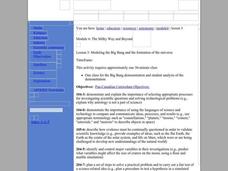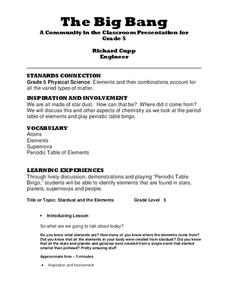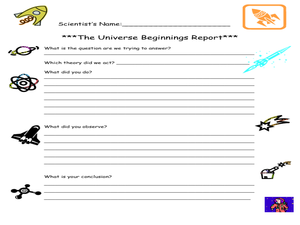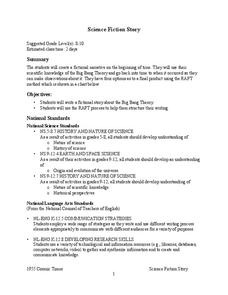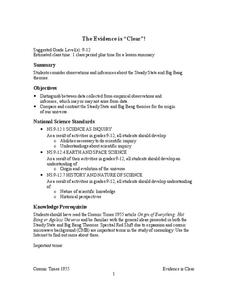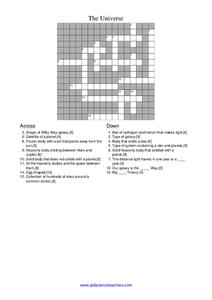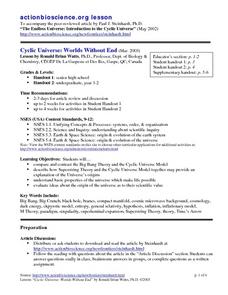Alabama Learning Exchange
The Big Bang Theory: An Evidence-Based Argument
What evidence supports the big bang theory? Individuals analyze scholarly resources about the the theory and develop arguments backed by evidence. They brainstorm, share ideas, watch a video, and read articles to complete a graphic...
School Science
The Big Bang Time Machine
Scholars take off on an interactive spaceship to explore a historical timeline of the big bang theory. They learn about the evolution of mammals and humans, the formation of stars and planets, and the chemical composition of the early...
Curated OER
The Big Bang Theory
Students will use scientific reasoning to formulate ideas about the formation of the universe using the Big Bang Theory. The use of critical thinking skills is part of the activity and the foundation of the scientific method will serve...
Curated OER
Modeling the Big Bang and the Formation of the Universe
Sixth graders conduct an experiment to understand the Big Bang Theory. In this Big Bang Theory lesson, 6th graders will observe a balloon with confetti popping to emulate and analyze information related tot he Big Bang theory. Students...
Curated OER
The Big Bang-Cosmic Expansion
In this Big Bang instructional activity, students are given the equation used to determine the rate at which the universe is expanding according to the Big Bang theory. Students solve 4 problems using this equation. They find the...
Curated OER
Learning from Light: The Big Bang
Students explore what astronomers are able to examine our galaxy and universe by examining light. They explore in this sub-unit the formation of the universe, commonly called "The Big Bang," and it follows studying from the Light: The...
Adrian College
The Universe
Young scientists create a simulation of Hubble's law. Introducing the Big Bang Theory using balloons and a simple lab worksheet, scholars complete a data table and perform analysis.
Curated OER
Integrating Space Science-Our Changing Universe
In this universe worksheet, students read about the big bang theory and the evolution of the stars from the elements. Students answer four critical thinking questions about the beginnings of our universe.
Curated OER
The Big Bang
Fifth graders relate the elements in the human body to those produced during a supernova. In this space science and chemistry lesson, 5th graders listen to a lecture and view visuals about the big bang. They relate the production of...
Curated OER
Space: The Universe As We Know It!
Students simulate the Big Bang. In this lesson on the origin of our universe, students role play to show how the Big Bang explosion may have created our universe.
NASA
Science Fiction Story
A lesson allows you to go back in time and see the big bang actually happen. Bazinga! In reality, pupils research the Big Bang Theory and theorize what it would be like to go back in time and see it happen. There are four different...
NASA
What’s the Problem with Isotropy?
Some patterns are so small, we can't see them without the help of technology. The same is true for cosmic microwave background radiation. During this activity and discussion, scholars examine both anisotropic and isotropic items and...
Curated OER
Understanding the Cosmic Microwave Background (CMB)
How did our universe really begin? Explore the Science Big Bang Theory and Cosmic Microwave Background (CMB) with this multiple activity-based lesson that demonstrates that the increase of density due to the decrease of temperatures,...
Glynn County School System
Cosmology
The past, the present, and the future ... there's so much to discover about the galaxy. Scholars learn about the creation of the universe, its current structure, and how it is changing. The PowerPoint presentation begins with a...
Massachusetts Institute of Technology
Nuclear Synthesis
Start this lesson with a bang! The eighth in a 13-part series of lessons explains the origin of elements beginning with the Big Bang Theory. The reading describes the formation of elements hydrogen through uranium.
NASA
The Evidence is “Clear”!
Do you think you know better? Become a scientist and prove it. Scholars review the evidence for two different theories of the origins of the universe. They notice the empirical observations as well as the inferences to determine which is...
Space Awareness
History of the Universe
Your pupils may believe that you and their parents are the oldest things in the universe, but surprise! There are elements of the universe that are even older. Elementary scientists create a class timeline to demonstrate the expansive...
Curated OER
Exploring Big Bang Evidence
Ninth graders study the Big Bang theory. In this big bang theory lesson students research the Internet and complete several activities and create a presentation.
NASA
Cosmic Microwave Background
Begin your next class with a BANG! Pupils discuss the formation of our universe and its expansion before proceeding with an activity designed to demonstrate what most likely occurred billions of years ago. They conclude with a discussion...
Curated OER
The Universe
In this space science worksheet, students use the clues given at the bottom of the sheet to complete the crossword puzzle relating to the universe. There are 16 clues to solve in the puzzle.
Curated OER
Scavenger Hunt: Who am I?
In this space science instructional activity, middle schoolers use the sites listed on the Solar System and Planets page of the Kid Zone to locate the names of the people credited with each discovery. They identify and name 26 different...
Curated OER
Cyclic Universe: Worlds Without End
Young scholars compare and contrast the Big Bang Theory and the Cyclic Universe Model. They explain basic properties of the univers which make life possible. They evaluate ideas about the origin of the universe as to their scientific value.
NASA
Cosmic Times 2019
NASA is planning a journey to Mars, and current scholars could very well be a part of a future mission. During the unit, pupils research the advances in space exploration and knowledge about the universe. Then they work in groups to...
Howard Hughes Medical Institute
Distribution of Elements in Earth’s Crust
How do scientists know the difference between a meteorite from space and a regular rock from the earth? Scholars read a passage and answer comprehension questions about the creation of the solar system. They extrapolate the main ideas to...




